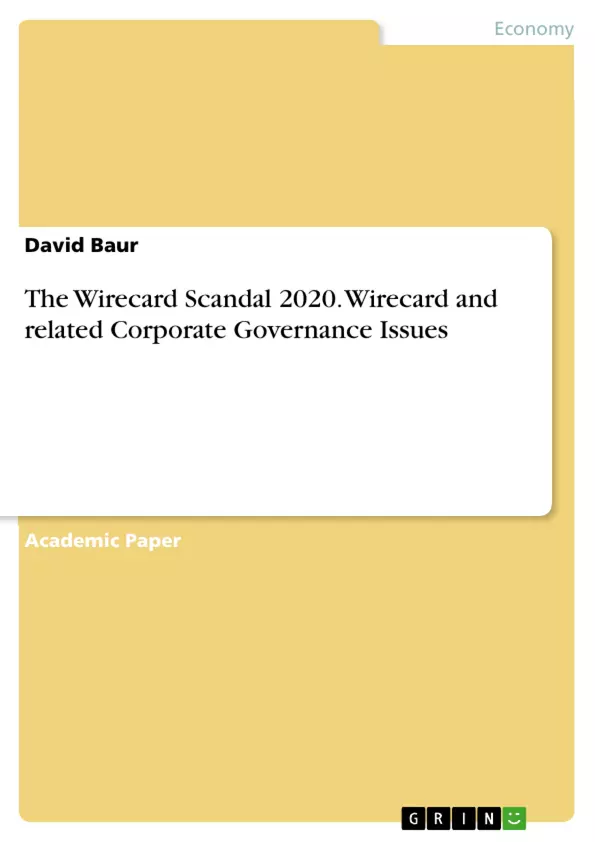This paper addresses the Wirecard scandal of 2020 and aims to derive related corporate governance issues. An analyzation of proposed solutions that should help to provide similar future crises is also part of the investigation. Firstly, it is argued that there is a confusion concerning the responsibility among german supervisors which needs to be clarified. Additionally, it is discussed that early warning signs must not be neglected. Finally, suggestions for necessary modifications within the external and internal audit process are given and analyzed.
Inhaltsverzeichnis (Table of Contents)
- Abstract
- Table of Contents
- List of Figures
- List of Abbreviations
- 1 Introduction to the Wirecard Case
- 2 Background Information about Wirecard
- 3 The scandal of Wirecard
- 4 Related Corporate Governance Issues
- 5 Lessons learned and proposed solutions
- 6 Summary and Outlook
- List of References
Zielsetzung und Themenschwerpunkte (Objectives and Key Themes)
This paper aims to explore the Wirecard scandal of 2020 and derive related corporate governance issues. The investigation also includes an analysis of proposed solutions that aim to prevent similar crises in the future.
- The confusion regarding responsibility among German supervisors
- The importance of not neglecting early warning signs
- Necessary modifications within the external and internal audit process
- The role of the Bundesanstalt für Finanzdienstleistungsaufsicht (BaFin) and the auditing company Ernst and Young (EY)
- The impact of the scandal on investors' trust in the financial markets
Zusammenfassung der Kapitel (Chapter Summaries)
- Chapter 1: Introduction to the Wirecard Case: This chapter provides a brief overview of the Wirecard scandal and its significance, highlighting the allegations of balance sheet manipulation and the role of the company's management in the fraud.
- Chapter 2: Background Information about Wirecard: This chapter offers an overview of Wirecard's history, including its founding, early struggles, and subsequent rise to prominence in the financial technology (FinTech) industry. It discusses the company's expansion into Asia and its listing on the DAX, highlighting the rapid growth that ultimately led to its downfall.
- Chapter 3: The scandal of Wirecard: This chapter details the unfolding of the Wirecard scandal, including the investigations by the Financial Times (FT), the initial allegations of fraudulent dealings, and the subsequent confirmation of accounting fraud by KPMG. It discusses the role of BaFin and its response to the scandal, including the controversial ban on short-selling.
- Chapter 4: Related Corporate Governance Issues: This chapter analyzes the various corporate governance issues revealed by the Wirecard scandal, including weaknesses in institutional oversight, lack of clarity in responsibilities, and the inadequacy of external audits. It examines the importance of trustworthy information channels, such as whistleblowers and short-selling, and explores the role of internal controls and compliance management.
- Chapter 5: Lessons learned and proposed solutions: This chapter discusses the lessons learned from the Wirecard scandal and proposes solutions to prevent similar crises in the future. It explores recommendations for reforming the supervisory process, strengthening auditor accountability, and improving internal control mechanisms.
Schlüsselwörter (Keywords)
The main keywords and focus topics of the text are: Wirecard, Wirecard scandal, Corporate Governance, Auditing, Supervision, BaFin, FinTech, Fraud, Accounting, Balance sheet manipulation, Institutional oversight, Early warning signs, Whistleblowers, Short-selling, Compliance Management Systems, Dualistic Corporate Governance model, German Corporate Governance Code, Single Capital Market Supervisor, Auditor Oversight Body.
- Quote paper
- David Baur (Author), 2021, The Wirecard Scandal 2020. Wirecard and related Corporate Governance Issues, Munich, GRIN Verlag, https://www.grin.com/document/988669



